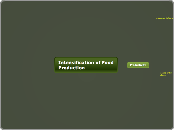Intensification of Food Production
Productivity
measured in terms of
Labour per Unit Area
Labour per Unit Area = number of workers/land area
Output per Unit Area
Output per unit area = amount of food produced/ land area
factors affecting food productivity
Physical Factors
Relief
physical height and slope of land
gentle or flat land = + productive for farming as water run off slower
Climate
determined by
average rainfall and temperature experienced in that place
areas with higher rainfall and higher temperature = higher farming output
with exceptions of potatoes and wheat, which grows with less water and lower temperature
soil
fertility of the soil
depends on
amount of air, water and nutrients present
the more minerals in the soil, the higher the productivity of the land
Social Factors
Land Fragmentation
the land is being divided to the number of children the owner of the land has
this means there will be less lands use for farming = less productions of food
Land Tenure
farmers need to pay the owner of the land they are farming on or living on
this causes farmers to have less motivation to farm = production of food will be reduced
Economic Factors
Demand
high demand encourages food producers to produce more food to meet the demands in order to earn money by selling crops
Capital
capital is the amount of money used to start or expand food production
this money is used to buy
seeds, fertilisers, pesticides and pay for operations in farm
fertilisers increase nutrients in the soil -> more fertilisers plants grow more healthy so output per unit area is increased
buy equipments to increase commercial fishing
buy sonar to locate school of fish
fishing becomes faster -> food becomes more productive as catches increase
Political Factors
government policies
government decides on how their resources are to be used to bring greater development in the country
also affects food productivity
example is the common fisheries policy
this helps maintain amount of fish in regeion for future generations but also fishing industry might be reduced
Technological Factors
use of modern machines and farming methods to have greater control over physical limitations and reduce amound of labour to increase productivity
Green Revolution
high-yielding varieties
improve strains of rice, wheat and other cereals to become pest resistant or to grow faster
mdoern irrigation methods
to supply water to the land through artificial means
examples human dykes, damns and canals to divert water from rivers
and also automated irrigation systems such as water sprinklers and sluice gates to control amount of water for watering crops
irrigation enagles amount of water supplied to the plants to be controlled
